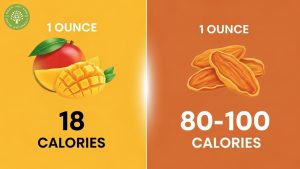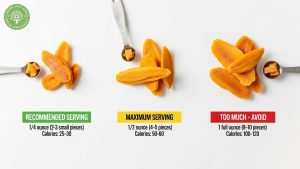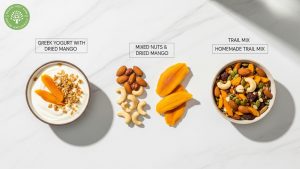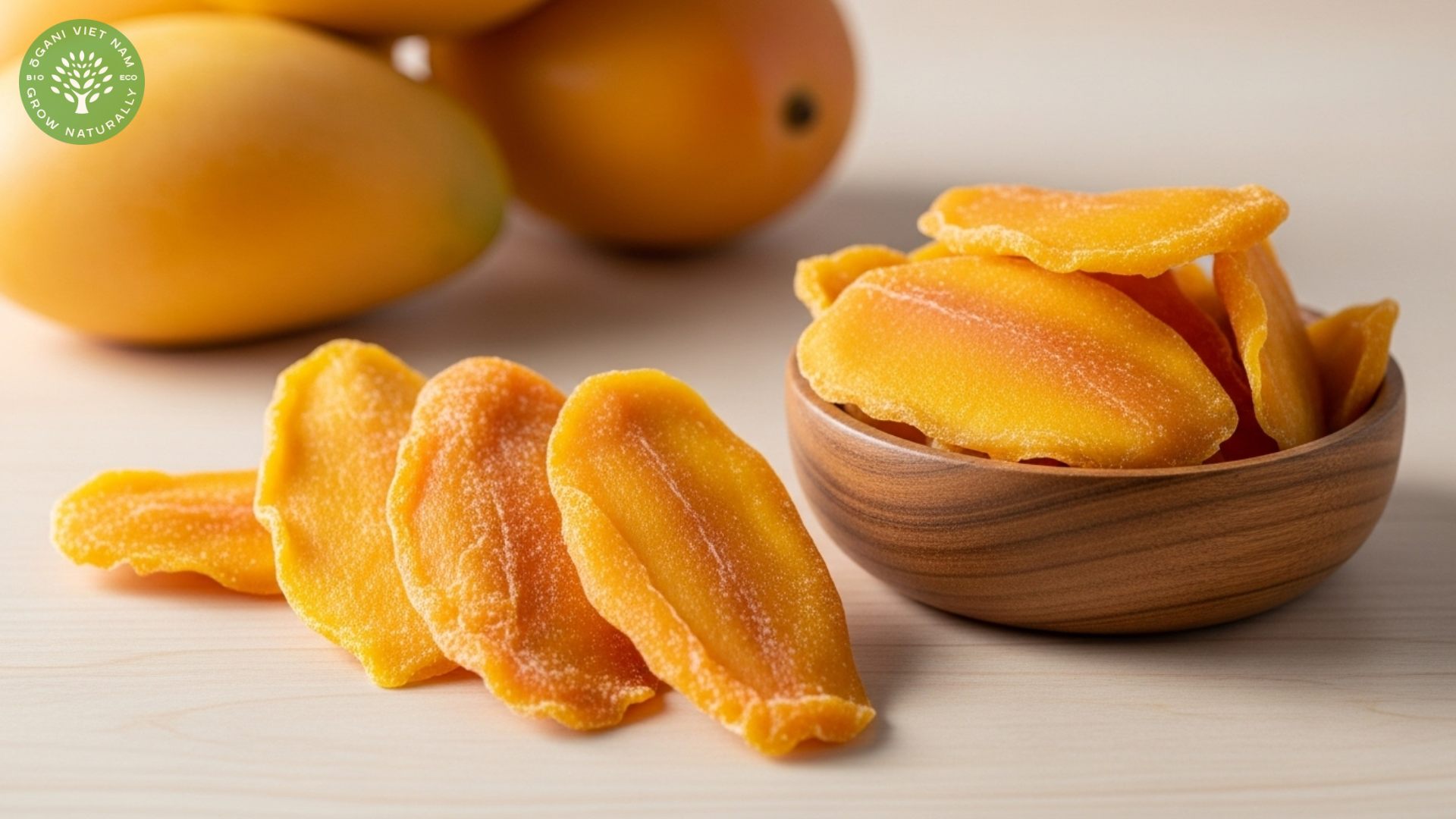Is dried mango fattening? Dried mango can be fattening if consumed in large quantities due to its concentrated natural sugars and calories, but moderate portions can fit into a healthy diet when chosen carefully and eaten as part of balanced nutrition.
At Ogani VN, we frequently receive questions about dried fruits and weight management. Understanding the caloric content and nutritional profile of dried mango helps you make informed decisions about including this tropical treat in your diet without sabotaging your health goals.
Why dried mango can be fattening: calorie and sugar content

The main reason dried mango can be fattening lies in its concentrated calorie and sugar content. When fresh mango is dehydrated, the water is removed but the natural sugars remain, creating a much more calorie-dense product. A single ounce of dried mango contains approximately 80-100 calories, compared to only 18 calories in an ounce of fresh mango.
The dehydration process concentrates the fruit’s natural fructose, making it easy to consume large amounts without feeling satisfied. Many people can eat several pieces of dried mango in one sitting, quickly accumulating 200-400 calories without realizing it. This unconscious overconsumption is what makes dried mango potentially fattening for weight-conscious individuals.
Additionally, many commercial dried mango products contain added sugars, oils, or preservatives that further increase the caloric content. These additives can push the calorie count even higher, making portions that seem small actually quite significant from a weight management perspective.
Đây là đoạn văn đầy đủ sau khi được viết lại:
How dried mango affects weight gain and metabolism
Is dried mango fattening due to blood sugar and fat storage
When asking is dried mango fattening, we must consider its impact on blood glucose levels. The concentrated sugars in dried mango can cause rapid spikes in blood glucose, particularly when consumed on an empty stomach. These blood sugar spikes trigger insulin release, and elevated insulin levels signal the body to store excess calories as fat rather than burn them for energy – making dried mango fattening for those watching their weight.
The glycemic index of dried mango is significantly higher than fresh mango due to sugar concentration and reduced fiber content per serving. This higher glycemic response directly answers why is dried mango fattening – it promotes fat storage more readily than its fresh counterpart, especially when consumed frequently or in large portions.
Why dried mango is fattening: satiety and portion control issues
Understanding is dried mango fattening requires examining satiety levels. One of the primary reasons dried mango can be fattening is its reduced satiety compared to fresh fruit. The removal of water content means you need to eat more pieces to feel satisfied, leading to higher calorie intake that makes dried mango fattening for weight-conscious individuals.
The chewy, sweet nature of dried mango can trigger cravings for additional sweet foods, potentially leading to overeating throughout the day. This cascade effect particularly explains why is dried mango fattening becomes a concern for people trying to manage their weight or reduce sugar cravings.
Is dried mango fattening compared to other dried fruits
When comparing dried fruits, dried mango falls somewhere in the middle range for caloric density. Dried dates and figs tend to be more calorie-dense, while dried apples and berries are typically lower in calories per serving. However, dried mango’s high sugar content and palatability make it easier to overconsume than some other dried fruit options.
The processing method significantly affects whether dried mango is fattening. Freeze-dried varieties often retain more volume and fiber, helping with portion control, while traditionally dried versions are more concentrated and calorie-dense. Unsweetened, naturally dried mango is less fattening than varieties with added sugars or honey coatings.
Compared to processed snacks like cookies or chips, dried mango does provide some nutritional benefits including vitamins, minerals, and antioxidants. However, from a pure calorie and weight management perspective, the concentrated nature of dried mango means it should be treated more like candy than fresh fruit in terms of portion sizes.
Smart strategies to enjoy dried mango without weight gain

Portion control and timing recommendations
The key to preventing dried mango from being fattening lies in strict portion control. We recommend limiting servings to 1/4 to 1/2 ounce (about 2-4 small pieces) at a time, treating it more like a small dessert than a snack. This portion provides the sweet satisfaction without the excessive calorie load that leads to weight gain.
Timing your dried mango consumption can also impact whether it contributes to weight gain. Eating it as part of a balanced meal or immediately before exercise allows your body to use the quick-release sugars for energy rather than storing them as fat.
Combining with protein and healthy fats

To reduce the fattening potential of dried mango, pair small portions with protein or healthy fats. A few pieces with a handful of nuts, or mixed into Greek yogurt, helps slow sugar absorption and increases satiety. This strategy prevents blood sugar spikes and reduces the likelihood of overeating.
Creating homemade trail mixes with measured portions of dried mango, nuts, and seeds gives you better control over serving sizes while providing balanced nutrition that supports healthy weight management rather than weight gain.
Alternatives and modifications for weight-conscious consumers
For those concerned about whether dried mango is fattening, consider these alternatives and modifications. Fresh mango, while seasonal, provides similar sweetness with more water content and fiber to help with satiety. Frozen mango pieces can satisfy cravings for something sweet and chewy without the concentrated calories of dried versions.
When purchasing dried mango, choose organic, unsweetened varieties without added oils or preservatives. Read labels carefully, as some products marketed as “natural” still contain significant added sugars that increase the fattening potential of the product.
You might also consider making your own dried mango at home using a dehydrator, allowing you to control the process and avoid any additives. Home-dried mango tends to be less concentrated than commercial versions, making it somewhat less fattening per serving.
Frequently Asked Questions
How many calories are in dried mango? Dried mango contains approximately 80-100 calories per ounce, making it quite calorie-dense compared to fresh fruit. A typical serving should be limited to 1/4-1/2 ounce to avoid excessive calorie intake.
Can I eat dried mango while trying to lose weight? Yes, but in very small portions and infrequently. Treat dried mango more like a dessert than a healthy snack, limiting yourself to a few small pieces occasionally rather than regular consumption.
Is unsweetened dried mango less fattening? Unsweetened dried mango is less fattening than varieties with added sugars, but it’s still concentrated in natural sugars and calories. Even unsweetened versions should be consumed in small portions for weight management.
What’s a healthy serving size of dried mango? A healthy serving size is 1/4 to 1/2 ounce (about 2-4 small pieces), containing roughly 20-50 calories. This provides sweetness without excessive calorie intake that could contribute to weight gain.
Making smart choices with dried mango
Is dried mango fattening? It can be if consumed in typical snack-sized portions, but small, controlled amounts can fit into a healthy diet. The key lies in understanding its calorie density and treating it more like a dessert than a health food.
At Ogani VN, we believe in helping our customers make informed choices about their nutrition. If you’re looking for high-quality, unsweetened dried mango that gives you better control over your portions, explore our selection of premium dried fruits with clear nutritional labeling. Contact our nutrition specialists for personalized advice on incorporating dried fruits into your weight management plan while still enjoying the flavors you love.
Read more:
- Is Dried Mango Fattening? Complete Guide To This Tropical Snack
- Best Dried Mango No Sugar Added: Premium Quality Guide
- Calories In Dried Mango No Sugar Added: Complete Nutrition Guide
- Dried Mango Nutritional Value: Complete Health Guide
- Health Benefits Dried Mango: Complete Nutrition Guide


